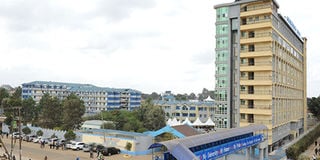MKU don beats 23 other finalists to scoop global innovation award

Mount Kenya University (MKU) lecturer and researcher, Mr Donatus Njoroge, was awarded the Global Innovation through Science and Technology (Gist Tech-1) 2019 Award during the Global Entrepreneurship Congress held in Bahrain on April 17, 2019. PHOTO | COURTESY
What you need to know:
- Donatus Njoroge scooped the Global Innovation through Science and Technology (Gist Tech-1) 2019 Award, beating 23 other finalists.
- Njoroge’s win cements MKU’s place as a research and innovation hub.
- His innovation adds onto a growing list of MKU research initiatives aimed at improving the quality of life.
A Mount Kenya University (MKU) lecturer and researcher has won global recognition for developing a novel bio-pesticide to manage post-harvest losses in grains.
Donatus Njoroge scooped the Global Innovation through Science and Technology (Gist Tech-1) 2019 Award, beating 23 other finalists.
This was during the Global Entrepreneurship Congress held in Bahrain on April 17.
Mr Njoroge’s award includes $15,000 in seed capital and $50,000 as Amazon web services credit. He will also receive specialised mentoring by David Hamod, President and CEO of the National US-Arab Chamber of Commerce.
The researcher’s win cements MKU’s place as a research and innovation hub. His innovation adds onto a growing list of MKU research initiatives aimed at improving the quality of life.

A panoramic view of Mount Kenya University Chancellor's Tower. PHOTO | MKU
CHALLENGE
Dr Bibianne Waiganjo-Aidi, MKU Deputy Vice-Chancellor Academic and Research Affairs, commended the researcher for his win.
“We as the MKU fraternity congratulate Donatus Njoroge on his innovation, which has pinned Kenya on the global innovation map. His research on post-harvest pest control is in line with the Food Security and Nutrition pillar of Kenya’s Big 4 Agenda."
Mr Njoroge says it was a big challenge competing with some of the best minds in the world.
“Being the only Kenyan in the competition made me nervous, but the desire to succeed kept me going. We were 24 finalists drawn from 18 different countries,” he says.
Mr Njoroge said the university’s support during the research and development phase was instrumental in his bagging the award.
RECOGNITION
The award, he points out, will go a long way in helping reduce post-harvest losses.
The researcher’s global recognition comes shortly after he won the 2018/2019 National Innovation award organised by the Kenya National Innovation Agency in line with the government’s Big Four agenda. The innovation award under the Agriculture, Food Security and Technologies category attracted Ksh800,000. This amount will be channelled through MKU.
He also won the East Africa Post-Harvest Technologies 2017 award in a competition organised by the United States Agency for International Development (USAID).
Mr Njoroge was also recognised as one of the top 50 innovators in Africa during the Africa Innovation Summit that took place in Rwanda last year. His project was also presented at The Next Einstein Forum, an international conference held in Rwanda the same year.
FIGHTING DRUG RESISTANCE
In yet another research initiative, the National Research Fund (NRF) has funded MKU researchers to find ways of fighting infection resistance to drugs.
The research project titled “Combating Antimicrobial Resistance Using Enhanced Guidelines and Stewardship”, seeks to develop guidelines on appropriate use of antibiotics prescribed for common infections.
The project team headed by Dr Jesse Gitaka, the principal investigator, will measure use of broad-spectrum antibiotics, antibiotic de-escalation, duration of hospital stay, and rates of re-admission in six selected hospitals.
The hospitals that will benefit from this project are Naivasha County Referral Hospital, Rift Valley Provincial General Hospital, Thika Level 5 Hospital, Kiambu Level 5 Hospital, Bungoma County Referral Hospital and Webuye District Hospital.
ANTIBIOTICS
Antimicrobial resistance (AMR) is one of the pressing public health concerns globally. This is because patients with multidrug resistant infections always require longer hospital stays, more expensive medication and are likely to die as a result of an infection.
The researchers aim to ascertain antibiotic resistance patterns of bacteria in the six hospitals. They will also collect data on healthcare workers’ knowledge, attitudes and practices regarding the use of the guidelines and the institution of antimicrobial stewardship programmes (ASPs).
These programmes promote the appropriate use of antimicrobials (including antibiotics), improve patient outcomes, reduce microbial resistance, and decrease the spread of infections caused by multidrug-resistant organisms).


